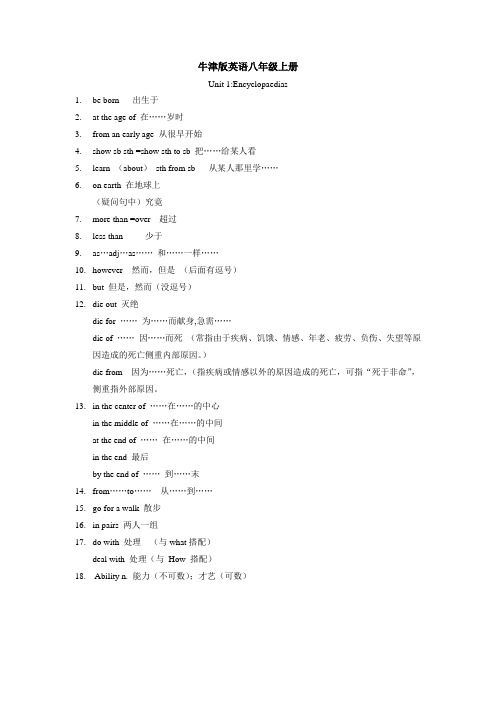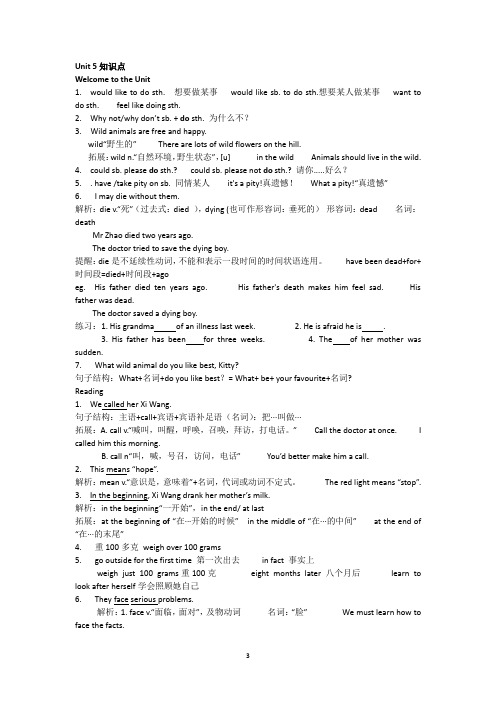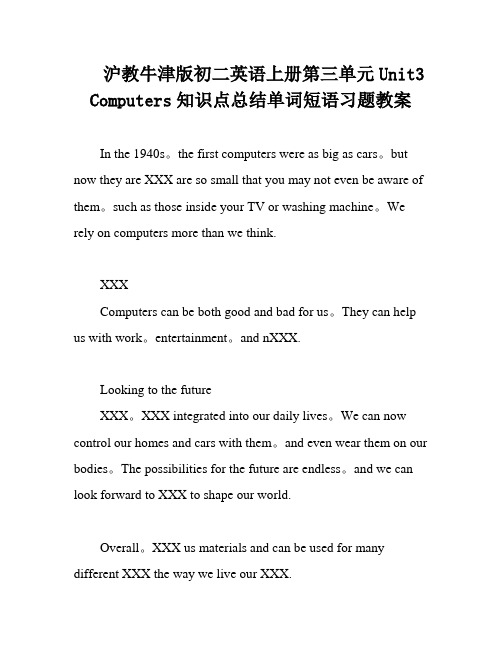牛津版英语八年级上册知识点总结
牛津译林版八年级英语全册语法知识点总结

1.句子结构:a.主语+谓语+宾语b.主语+谓语+间接宾语+直接宾语c.主语+谓语+宾语+宾语补足语d.主语+谓语+宾语+宾语补足语+定语e.主语+系动词+表语f.主语+不及物动词2.时态:a.一般现在时:表示现在经常性、习惯性的动作或状态。
b.现在进行时:表示现在正在进行的动作。
c.一般过去时:表示过去发生的动作或状态。
d.过去进行时:表示过去其中一时刻正在进行的动作。
e.一般将来时:表示将来的动作或状态。
f.将来进行时:表示将来其中一时刻正在进行的动作。
3.语态:a.主动语态:主语是动作的执行者。
b.被动语态:主语是动作的承受者。
4.动词时态和语态的被动形式:a. 一般现在时的被动形式:am/is/are+动词的过去分词。
b. 一般过去时的被动形式:was/were+动词的过去分词。
c. 将来时的被动形式:will be+动词的过去分词。
d. 现在进行时的被动形式:am/is/are+being+动词的过去分词。
e. 过去进行时的被动形式:was/were+being+动词的过去分词。
5.情态动词:a. can:表示能力、允许和请求。
b. may:表示许可、可能性和祝愿。
c. must:表示肯定、必要性和推测。
d. should:表示建议、责任和承诺。
e. might:表示推测、可能和祝愿。
f. would:表示假设、请求和习惯。
6.虚拟语气:a.虚拟语气用于表达虚构、假设、愿望、建议等。
b. 虚拟语气主要涉及以下几个时态:一般过去时、现在将来时、与现在相对的过去将来时、would/could+动词原形。
7.上文一致性:a.当主句用一般现在时态表述,宾语从句中的谓语动词将会保持不变。
b.当主句用过去时态表述,宾语从句中的谓语动词将用相应的过去时态。
总结完毕,以上是牛津译林版八年级英语全册所涉及的主要语法知识点。
沪教牛津版英语八年级上册知识点一览表

现在完成时时态
introduce...to...、come over(to...)
6 Ancient stories
单元标题
P81-96
ancient、Trojan、war、understand、difference、pyramid、captain、Greek、capture、soldier、huge、pull 1.since、for 与现在完成
1.条件状语从句 (if/unless) 2.主现从现/主将从现
speech、notice、competition、treasure、text、chance、confidently、topic、winner、advise、several、 1.情态动词should的学习及
P113-128 opinion、whole、suggestion、communicate、whenever、rich、poor、hide、attack、shy、else、choose、
Educational exchanges
P49-64
advertisement、funny、create、telephone、wheel、comfortable、carriage、century、passenger、invent、 1.不规则变化 practical、since、distance、mobile phone、anytime、develop、lamp、candle、daytime、dust、special、 (good/well,good and
P17-32
chessboard、double 、 amount、rest 、gold、instead、realize、copy、correctly、 traffic 、accident 、a long
牛津版英语八年级上册Unit-1主课文重点知识

牛津版英语八年级上册
Unit 1:Encyclopaedias
1.be born 出生于
2.at the age of 在……岁时
3.from an early age 从很早开始
4.show sb sth =show sth to sb 把……给某人看
5.learn (about)sth from sb 从某人那里学……
6.on earth 在地球上
(疑问句中)究竟
7.more than =over 超过
8.less than 少于
9.as…adj…as……和……一样……
10.however 然而,但是(后面有逗号)
11.but 但是,然而(没逗号)
12.die out 灭绝
die for ……为……而献身,急需……
die of ……因……而死(常指由于疾病、饥饿、情感、年老、疲劳、负伤、失望等原因造成的死亡侧重内部原因。
)
die from 因为……死亡,(指疾病或情感以外的原因造成的死亡,可指“死于非命”,侧重指外部原因。
13.in the center of ……在……的中心
in the middle of ……在……的中间
at the end of ……在……的中间
in the end 最后
by the end of ……到……末
14.from……to……从……到……
15.go for a walk 散步
16.in pairs 两人一组
17.do with 处理(与what搭配)
deal with 处理(与How 搭配)
18. Ability n. 能力(不可数);才艺(可数)。
上海牛津版八年级知识点

上海牛津版八年级知识点上海牛津版八年级教材是一本非常经典的英语教材,它涵盖了很多重要的英语知识点。
在本文中,我们将会讨论这些知识点及其重要性。
第一章:基础语法在学习任何语言时,语法是必不可少的一部分。
在上海牛津版八年级教材中,基础语法知识点包括动词时态、语态、情态动词、虚拟语气、名词、代词、形容词和副词等。
这些知识点是理解英语语言的必要基础。
第二章:阅读理解技巧阅读理解技巧是英语学习的核心部分。
在上海牛津版八年级教材中,阅读理解技巧包括主旨大意、推理判断、细节理解和词汇推测等。
这些技巧的掌握,不仅可以帮助学生更好地理解英语文章,也可以提高他们的阅读速度和阅读技巧。
第三章:写作技巧写作是英语学习的重要部分。
在上海牛津版八年级教材中,写作技巧包括词汇扩展、句型转换、段落组织和文章结构等。
这些技巧的掌握可以帮助学生更好地表达自己的观点,提高英语写作水平。
第四章:听力技巧听力技巧在英语学习中也占有重要的地位。
在上海牛津版八年级教材中,听力技巧包括听力复述、听力填空和听力选择题等。
学生需要通过不断的练习和提高,才能够更好地掌握英语听力技巧。
第五章:口语技巧口语是英语学习的重要组成部分,但口语技巧也是学习中难点之一。
在上海牛津版八年级教材中,口语技巧包括发音、口语表达和口语交际等。
学生需要勤加练习,才能够更好地掌握英语口语技巧。
总之,上海牛津版八年级教材涵盖了很多重要的英语知识点,包括基础语法、阅读理解、写作、听力和口语技巧等。
学生需要通过不断的学习和练习,才能够更好地掌握这些知识点,提高英语学习水平。
牛津译林版英语八年级英语上册 Unit5知识点梳理

Unit 5知识点Welcome to the Unit1.would like to do sth. 想要做某事would like sb. to do sth.想要某人做某事want to do sth. feel like doing sth.2.Why not/why don’t sb. + do sth. 为什么不?3. Wild animals are free and happy.wild“野生的” There are lots of wild flowers on the hill.拓展:wild n.“自然环境,野生状态”,[u] in the wild Animals should live in the wild.4. could sb. please do sth.? could sb. please not do sth.? 请你.....好么?5. . have /take pity on sb. 同情某人it's a pity!真遗憾!What a pity!“真遗憾”6. I may die without them.解析:die v.“死”(过去式:died ),dying (也可作形容词:垂死的)形容词:dead 名词:deathMr Zhao died two years ago.The doctor tried to save the dying boy.提醒:die是不延续性动词,不能和表示一段时间的时间状语连用。
have been dead+for+时间段=died+时间段+agoeg. His father died ten years ago. His father's death makes him feel sad. His father was dead.The doctor saved a dying boy.练习:1. His grandma of an illness last week. 2. He is afraid he is .3. His father has been for three weeks.4. The of her mother was sudden.7. What wild animal do you like best, Kitty?句子结构:What+名词+do you like best?= What+ be+ your favourite+名词?Reading1.We called her Xi Wang.句子结构:主语+call+宾语+宾语补足语(名词):把···叫做···拓展:A. call v.“喊叫,叫醒,呼唤,召唤,拜访,打电话。
沪教牛津版初二英语上册第三单元Unit3 Computers知识点总结单词短语习题教案

沪教牛津版初二英语上册第三单元Unit3 Computers知识点总结单词短语习题教案In the 1940s。
the first computers were as big as cars。
but now they are XXX are so small that you may not even be aware of them。
such as those inside your TV or washing machine。
We rely on computers more than we think.XXXComputers can be both good and bad for us。
They can help us with work。
entertainment。
and nXXX.Looking to the futureXXX。
XXX integrated into our daily lives。
We can now control our homes and cars with them。
and even wear them on our bodies。
The possibilities for the future are endless。
and we can look forward to XXX to shape our world.Overall。
XXX us materials and can be used for many different XXX the way we live our XXX.1.You always seem to have XXX(改写并补充了意思)2.In the 1940s。
the first computers were larger than cars。
(改正了单数/复数错误)3.You may not be aware of their existence。
牛津译林版八年级上册8A英语期末复习各单元语法知识点提纲
牛津译林版八年级上册8A英语期末复习各单元语法知识点提纲【Grammar1】一.形容词的两大基本用法:1.做定语修饰名词;2.放在系动词后做表语. 可以做系动词的动词: be; 五感类动词;表示状态改变和不变的动词。
注意:形容词修饰不定代词时放在不定代词之后;二.形容词的比较级和最高级Ⅰ. 形容词比较等级形式变化:1.规则变化1)单音节词末尾加-er(比较级),-est(最高级) :great greater greatest ; small smaller smallest ; clean cleaner cleanest 2)单音节如以e结尾,只加-r(比较级),-st(最高级)fine finer finest ; wide wider widest3)闭音节单音节词如末尾只有一个辅音字母,须先双写这个辅音字母,再加-er(比较级),-est(最高级)big bigger biggest ; hot hotter hottest ; red redder reddest4)以辅音字母+y结尾的词,则变y为-i,再加-er和-est。
easy easier easiest ; busy busier busiest5)部分双音节和多音节词在前面加单词more和most。
Careful more careful most carefulDifficult more difficult most difficult2.不规则变化good/well better best bad/ill worse worstmany/much more most little less leastfar farther/further farthest/furthest注:有些形容词一般没有比较等级。
如: right, wrong等。
三. 形容词比较级的用法:表示两者(人或物)的比较。
⒈表达“A大于B”用 A …比较级+than B①. Tom比我胖。
牛津英语八年级上册单元知识点归纳
牛津英语八年级上册单元知识点归纳作者:(您的名字)一、Introduction在牛津英语八年级上册的学习中,我们接触到了许多重要的知识点,包括语法、词汇、阅读和写作等。
本文将根据课程的内容,深入探讨这些知识点,帮助大家更好地理解和掌握英语语言技能。
二、Grammar Points在这个单元中,我们学习了许多重要的语法知识,如过去完成进行时、虚拟语气、定语从句等。
其中,对我来说,过去完成进行时是一个比较难以理解和掌握的语法点。
过去完成进行时表示在过去某个时间点前已经开始并继续发生的动作,这种时态需要考虑动作的进行状态和完成状态,需要结合具体的语境和情境来理解和使用。
三、Vocabulary在这个单元中,我们掌握了大量的单词和词组,如表达建议的动词、形容词的比较级和最高级等。
其中,我觉得表达建议的动词最有趣,因为它们可以帮助我们更好地表达自己的意见和建议。
suggest、advise、recommend等动词都有不同的用法和语气,需要我们仔细区分和运用。
四、Reading Comprehension阅读理解是英语学习中非常重要的一部分,通过阅读能够扩大我们的词汇量和语言表达能力。
在本单元中,我们接触了一些有趣的阅读材料,包括新闻报道、小说片段等。
其中,我印象最深刻的是一篇关于环保的文章,它提醒我们应该如何保护环境,守护地球,这让我深刻理解到环保问题的重要性。
五、Writing Skills写作是提高英语能力的重要途径之一,通过写作能够更好地表达自己的想法和观点。
在这个单元中,我们学习了如何写议论文、书信等不同类型的作文。
我觉得写议论文是一个挑战,因为需要我们清晰地表达自己的观点,同时能够提出有说服力的论据和证据。
六、Conclusion通过本单元的学习,我对这些重要的知识点有了更深入的理解和掌握。
通过不断的练习和实践,相信我在英语学习中会取得更好的成绩。
我也意识到学习英语不仅仅是学习语法和词汇,更重要的是要理解和运用语言背后的文化和思维方式。
初中英语 江苏专版牛津译林八年级上册 Unit 3 知识点总结
译林版八上U3知识点总结e on. Hobo. 来吧,霍波。
解析:come on意为“来吧,赶快",表示催促。
如:➢ Come on! The bus is leaving.快点儿!公交车就要开走了。
扩展:come on还可以表示“挑战、命令、恳求、激励别人、给别人助威等”。
如:➢ Come on, and see with your own eyes!跟我来,你亲眼看看吧!➢ Come on! You can do it!没问题!你能行!➢ Come on! Come on!加油!加油!2.Let's enjoy ourselves! 让我们尽情享受吧!解析:enjoy oneself意为“玩得愉快,过得开心”,相当于have a good time/have fun。
如:➢ We enjoyed ourselves at the top of the mountain.= We had a good time at the top of the mountain.我们在山顶上玩得很愉快。
提醒:使用enjoy oneself短语时,enjoy后的反身代词在人称上要与enjoy前的主语保持致。
3.Take care! 保重!解析:take care,动词短语,意为“保重",常用于向朋友或家人道别。
如:➢ Take care, my son. 保重,我的儿子。
拓展:take care还可表示“当心;注意”,相当于look out或be careful。
如:➢ Take care! The ice is thin. 当心!冰很薄。
4.We're going to the top of the Eiffel Tower this afternoon!今天下午我们要登上埃菲尔铁塔啦!解析:top,名词,意为“顶部,(物体的)上面”。
the top of意为“....的顶部”。
(牛津版深圳版)英语八年级上册全册课文知识点(详细)
(牛津版深圳版)英语八年级上册课文知识点Unitl ①Encyclopedias②Look it up!③Here a旧two articles from an encyclopaedia.Da Vinci, LecmardoLeonardo da Vinci(1452-1519) was an @ Italian ⑤。
ainter, inventor, musician, engineer and scienlist. Da Vinci @was born ⑦in the countryside. ©From an early age, he ⑨showed great intelligence and artistic ability.⑩As he grew older, he @ leamt io do many @ifferent things. His paintings are very famous, and one, the Mona Lisa, is @erhaps the most famous painting in the world. He also had many inventions.®For example, his notebooks include some interesting drawings of Hying machines. (See Art) DinosaursDinosaurs lived 够n Earth more than ⑱()million years before 碰uman beivgs. They lived ************************************************************************* elephants. Some could even fly.Many dinosaurs ate plants. However, some dinosaurs liked to eat meat.Dinosaurs lived on Earth for more than 150 million years. Then, suddenly, they all (jjlied out. Nobody knows why. However, we can (2jbarn about them from their fossils. (See Earth history)知识点©encyclopedia 百科全书②look up 查阅;look it up; look out 小心;look through 浏览:look at 看③Here be句型主谓一致看后面©Italian a.意大利的n.意大利人,意大利语;German; French©painter 画家;invenlor 创造家;musician 音乐家,engineer 工程师;scientist 科学家@be born 出生©in the countryside 在乡下⑧From an early age 从早期⑨show great intelligence 展示出才能⑩As he grew older当他长大;as当…时候@barn to do sth 学习做某事;study 研究;learn about/know about 了解,学习©lifferent a.不同的;be different from 和…不同;difference n.不同,差异(perhaps 可能;probably; possibly; maybe⑭or example 例如;such as 例如including@n earth在地球上on Mars在火星上@60 million years 6(X)0 万年;a few/some million; millions of...⑱uman beings 人类⑱ome...others…一些...,另一些;one...the other...一个,另一个;another…再一个;one...lhe others..一个…剩余的全部;other..其他的,另外的@ie out灭绝了;die from/of因..而死亡;die down熄火:die off相继死去㉔team...from...从...学习;learn to do sth 学习…;learn about 了解,学习到...More practiceA pen giantDo you know Laszlo Biro? (DMaybe you do not, but you Oprobably use his invention every day, and you may even have it in your hand G)right now!Biro (1899-1985) was the inventor of the ballpoint pen. He <3)wasborn in Budapest, Hungary. (5)In the 1930s. when he worked as a newspaper editor, he ⑦ used a fountain pen almost every day.@However, he had to refill it Oall the time. The ink Oalso did not dry Q easily, and it Gsometimes Qmade a mess on the. paper. Biro wanted a belter pen. His brother, George, helped him develop a Ospecial ink. The ink dried easily. Then they developed Qa new type of pen. There was a C7tiny ball at the tip of the pen. The ball (Srolled ink onto paper Gas it moved. They SJcahed it ihe "ballpoint" pen.The ballpoint pen was a great Dsuccess. Everyone loved it. Now millions of people use it Gall over ihe world every day.People will always Qremember Biro for his invention. Today in many 四English-speaking countries, people 0still use the word "biro" to ⑯refer to any kind of ballpoint pen.(D maybe adv.may be情态动词♦probably (可能性最大)maybe; perhaps; possiblyG)right now立刻;马上=right away=at once=immcdiately⑷be bom出生bcar-bore-born⑤in the 1930s在20世纪30年代In 1930 在1930 年©work as作为…(职业)而工作work for为…而工作Qused to do过去常常be used to do被用来做…be used to doing 习惯于…®almost:nearly几乎;差不多©however 然而=never(heless=butOall the time 一直Oalso句中too肯定句句末either否认句句末as well句末Oeasilyadv.修饰动词Gsometimes = at times 有时some times = several times 很屡次sometime在未来的某个时间some time 一段时间Qmakeamess制造混乱;一团糟□special 特殊的=unique二especial especially 尤其是(Sa type of 一种=a kind/sort ofC7tiny=small= littlelarge=big(Broiled滚动,转动0as当…时;whenSDcall命名;叫做二nameOsuccess n.成功Successful adj.成功的succeed in doing成功做某事=be successful in doing=have a success in doingGall over the world 全世界=around/across/throughout the world=everywhere in the worldDrcmcnibcr to do记得去做某事remember doing记得做过某事forget to do忘记去做某事forget doing忘记做过某事stop to do停下来去做另外一件事stop doing停下来正在做的事©English-speaking countries 说英语的国家spoken English 英语口语必still adv.仍然;adj.静止的Prefer宁愿;更喜欢prefer to do; prefer doing; prefer sth.喜欢prefer A to Bprefer doing A to doing Bprefer to do A (rather) than do BUnit5ReadingAn ①exchange visit is (2)educational and Ginteresting!④ A group of British students from Woodpark School in London are visiting Xinhua Junior High School in Beijing on an educational exchange.T was very (5)nervous at first,“ says Sarah. However, my Q host family are really ® friendly. ©Tin glad to be a guest in their home. I,ve G)learnt to use chopsticks, and they,re teaching ine a little Chinese!”The students Ospend the weekdays studying with Chinese students. QAt the weekend, they Dtour around Beijing and visit Gplaccs of interest with their host families.Tt's been a fantastic experience Gso far/' says Eric. "I've learnt C5a bit of l'ai chi, and I really enjoy it. We've already learnt a lot about Chinese Dculture and history. The teachers have CSinlroduced us I。
- 1、下载文档前请自行甄别文档内容的完整性,平台不提供额外的编辑、内容补充、找答案等附加服务。
- 2、"仅部分预览"的文档,不可在线预览部分如存在完整性等问题,可反馈申请退款(可完整预览的文档不适用该条件!)。
- 3、如文档侵犯您的权益,请联系客服反馈,我们会尽快为您处理(人工客服工作时间:9:00-18:30)。
八年级知识总结(上册) Module1:My life U1:Penfriends U2:Work and play U3:Trouble Module2:Amazing things U4:Numbers U5:Encyclopaedia
Module3:Section fiction U6:Nobody wins U7:Nobody wins ⅠWords: 1. penfriend 笔友 pen pal 2. magazine 杂志 a literary magazine 文学杂志 women’s magazine 妇女杂志 →n. magazinist 期刊编辑 3. hobby 业余爱好 4. chess 国际象棋 chessman 棋子(pl. chessmen) chessboard 棋盘 5. own 拥有 own up 承认错误 owner 所有者 物主 业主 6. good/well—better---best 7. architect 建筑师 architecture 建筑学 8. nearby adv. 在附近 不远 adj. 附近的 邻近的 9. keen adj. 热心的 渴望的 敏锐的 灵敏的 Keenly adv.敏锐地 keenness n. 敏锐 10.ambition 雄心 抱负 be full of ambition 野心勃勃 ambitious adj. 有雄心的 11.enclose 附上 Ⅱ Phrases 1. at the end 在………的末端 2. be keen on 热心于做 热衷于……… 3. play chess 下象棋 4. twelve years old 5. a boy called Tom 一个名叫Tom 的男孩 a boy named Tom a boy with the name Tom 6. best wishes 最好的祝愿 7. by +交通工具 = take +a/an +交通工具 8. tell sb. about sth. 告诉某人关于某事 tell sb. to do sth. 告诉某人做某事 tell sb. not to do sth. 告诉某人别做某事 9. enjoy doing sth. 喜欢做某事 like doing sth. mind /practice/finish/ 10. speak /tell /say/talk say 说 述说 speak 说话发言 电话来时用speaking talk 说 谈话 of/about tell 告诉 讲述 Ⅲ Sentence 1. make it +adj. for sb. to do sth. it 形式宾语 2. sth. +be+ to do 动词不定式做表语 3. I hope you will write to me soon . 我希望你尽快给我回信 hope 有可能实现的愿望 wish 不大可能实现的愿望 hope to do 希望做某事 wish sb. to do 希望某人做…….. Ⅳ Grammar Ⅰquestion words (疑问词) what、who(whom) / whose/which/when/where/how/why how many/much/long/far/soon/fast/often/ how many times Ⅱ 冠词 1.不定冠词a/an的用法 “不见“原因”(发元音)别施“恩”(an) 特殊案例:前需要加a 的 :university a usual book Europe 欧洲 European 欧洲人 one-day trip 需要加an 的: unhappy + n. uncle unusual + n. 2. 定冠词the的用法 特指双方熟悉,上文已经提起。 世上独一无二,方位名词乐器。
某些专有名词,还有复数姓氏。 序数词最高级,习惯用语牢记。 特殊案例:a bright moon 4. 零冠词的用法 “以下情况冠词免,学科球类三顿饭 ,名词复数表泛指,季节星期月份前” 特殊案例:a good breakfast
Unit 2 ⅠWords 1. whizz-kid 神童 优等生 n. 顶部 顶端 盖 顶盖 2. several adj.& pron. 几个少许 3. successful adj. 成功的 adj. unsuccessful 不成功的 succeed v.成功 success n. 成功 be successful in 在……..上成功 4.Business n. 买卖 生意 商业 businessman 商人 生意人(男pl. businessmen) businesswoman (女)商人(pl. businesswomen ) 5.luckily 幸运地 adv. 反义词:unluckily luck n.幸运 运气 lucky adj. 幸运的 6.popular adj.受欢迎的 流行的 unpopular adj.不受欢迎的 be popular with 受到………的欢迎/喜爱 7. sell 卖 出售 sell out 售完 全部出售 seller n. 卖者 卖方 8.over adv. 超过 多于 more than 9.manager n. 经理 管理人 manage v. 管理 经营 10.company 公司 (事业business或贸易trade活动而集结的团体) business n.盈利为目的的商业活动商店或场所 firm 合伙公司 11.responsible adj. 有责任的 负责人的 irresponsible 不负责任的 be responsible for 对………负责 12.sale 销售 出售、大减价 for sale 待售 出售 13.discuss v.讨论 discussion n. 讨论 discuss with sb. 和某人谈话 和某人讨论 14.simple 简单的 简易的 (单一不复杂) easy 不难 15.achieve v. 完成到达 achievement n. 成绩 功绩 16.fail v. 失败 failure n. 失败 不及格 17.collect v.领走 接走 收藏 收集 collection n. 收藏品 collect 有目的的或有挑选的收集 gather有少到多的收集 18.return v. 返回 回到 return sth. to sb. / give sth. back to sb. 把某物还给某人 19.attend 出席 join 加入(组织) join in 参加某些活动 take part in 参加(群众性具体活动会议等) enter for 报名参加 (比赛项目) 20.assist v. 帮助 n. assistant 助手 assist sb. with sth. 帮助某人做某事 assist sb. in doing sth. 帮助某人做某事 help sb. (to)do sth. 帮助某人做某事 help sb. with sth. 帮助某人做某事 21. continue 继续连续 延续 ⅡPhrases 词组 1. get up 起床 get on 上车 get off 下车 get back 返回 2. Put on (强调动作) take off 脱下 wear (强调状态) in+ 衣服名词/ 颜色 with 眼镜手套之类的 (不可与衣服搭配) 3.over breakfast 吃早餐时 4.work on 从事……..的研究 out of work 失业 at work 在工作 a piece of work 一份工作 work out 解决 找到答案 a job 一分工作 5.make phone calls 打电话 telephone sb. call sb. make a phone call to sb. call sb. up 6.On the way 在路上 on one’s way (to )在…….的路上 In the/one’s way to 挡在……路上 7.twice a week 一周两次 once a week three times a week 8. ask sb. to do sth. 要求某人做某事 ask sb. not to do 要求某人不要做某事 tell sb. to do sth. 告诉某人做某事 tell sb. not do sth. 告诉某人不要做某事 9.have dinner with sb. 与某人共进晚餐 10. continue doing sth. 继续做某事(该件事情已经做了一部分继续做相同的事情) continue to do sth. 继续做某事(从一件事情到另外一件事情) Tom will continue to do his homework after dinner . Tom will continue doing his homework for another two hours . Ⅲ Sentences 句子 1. must be 一定(对现在情况的肯定猜测) can’t be 不可能是(对现在情况的否定猜测) 2. one of the + 形容词最高级 +可数名词复数 “最……..之一” (谓语动词三人称单数) 3. before 在……之前 the day before yesterday 前天 the day after tomorrow 后天 (1) before 在…..前面 在……之前 after在…..之后 (2) before 从过去某时间的“以前” 那时以前 ago 以现在为基准(现在以前) 4.because 因为 (后接句子) because of 因为 Ⅳ Grammar (一) 一般现在时
